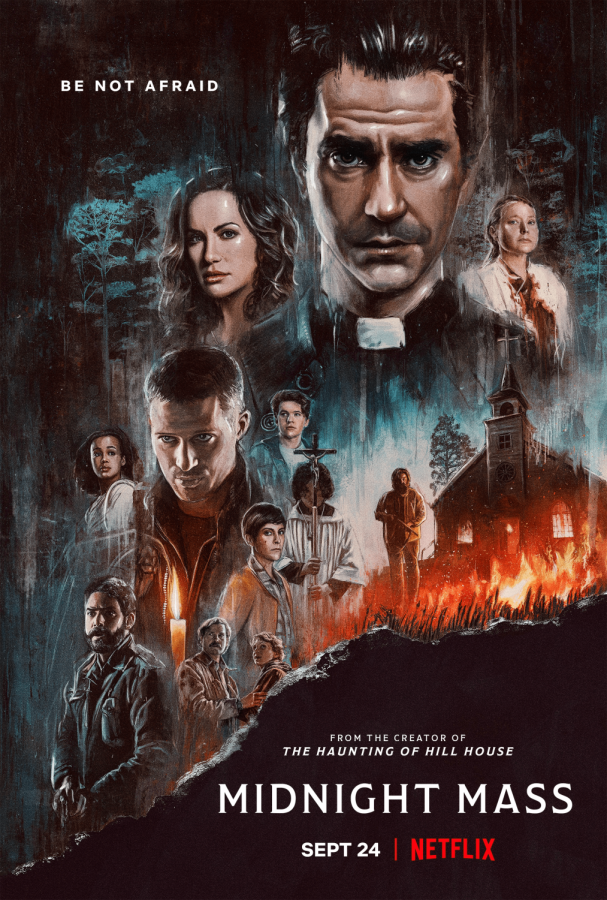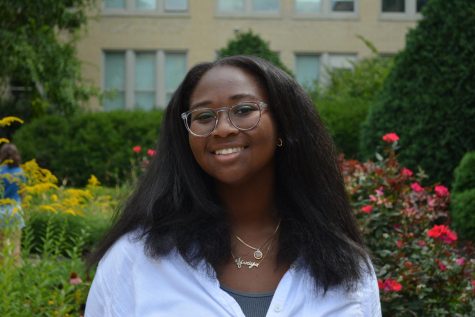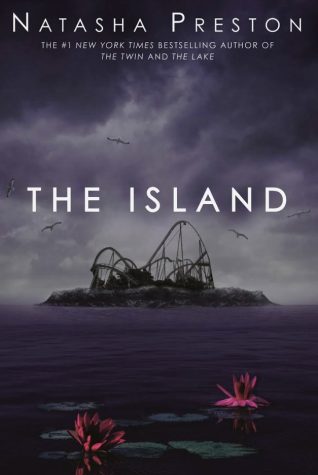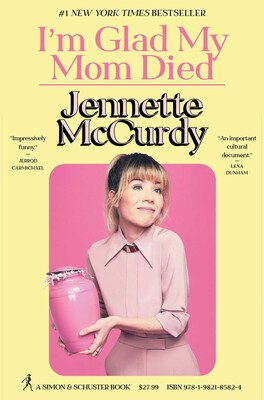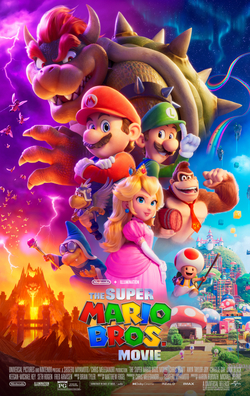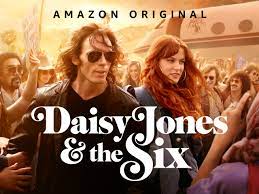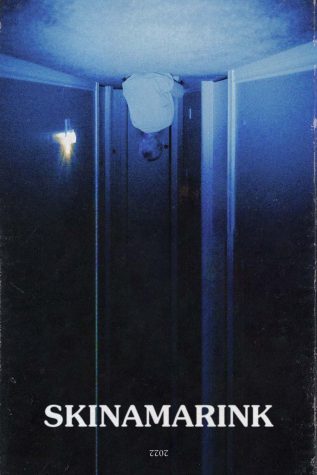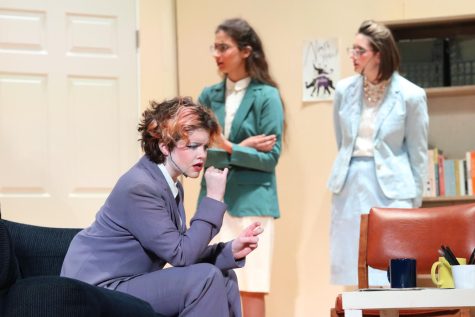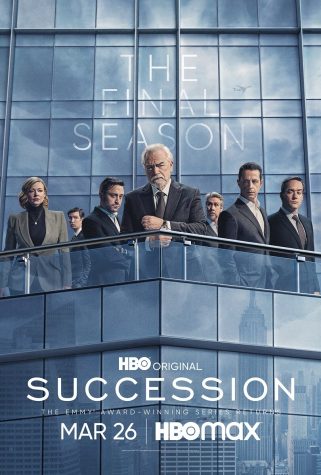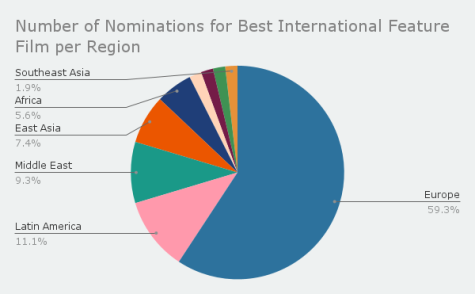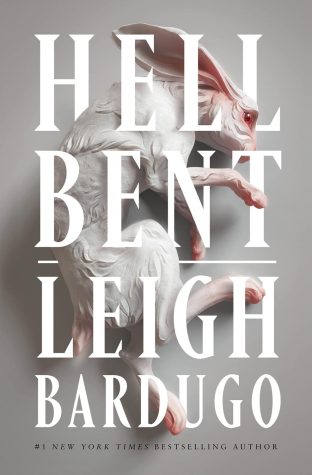Midnight Mass’ dives deep into the horrors of religion in American society
October 29, 2021
America was founded on a puritan belief of being a “city upon a hill,” in which we are a model society with pure Christian values and high strung morals which set a precedent of freedom and religious tolerance. Christianity has long been used to justify the often cruel and unjust actions we as humans consistently make, from the use of slave labor in early America, to the abortion bans currently filling our present-day newsfeeds.
That idea of how far we as a society can go to justify immoral actions with religion is perfectly explored throughout the mini-series “Midnight Mass” (2021), where one of horror’s cheesiest tropes, vampires, is used to symbolize the battle between religion, death and morality within society.
The tale of “Midnight Mass” begins in Chicago, with protagonist Riley Flynn, portrayed by actor Zach Gilford, looking onto the lifeless body of a blonde woman, whose face is covered in glass. As the camera slowly pans out to reveal the site of a car crash, it is soon revealed to viewers that Riley was the drunk driver that caused the crash.
Fast forward four years and Riley is now back home on Crockett Island, where he must make amends with his family members and the sleepy town he left behind. However, the town doesn’t remain sleepy for long as the arrival of a new priest, Father John Paul (Hamish Linklater), brings mysterious disappearances and bizarre phenomena to the island.
The core group of characters consist of Riley, his family, his ex-best friend/former crush Erin (Kate Siegel), Sheriff Hassan (Rahul Kohli), Dr. Sarah Gunning (Annabeth Gish) and her mom (Alex Essoe), Beverly Keane (Samatha Sloyan) and Father Paul.
Throughout the mini-series, viewers follow this group of eccentric characters as some of them team up to battle this new malevolent presence, Father Paul, while others embrace this dark figure with open arms.
As the series progresses, viewers can experience a veil of darkness being draped over and suffocating the once pure island along with the characters.
Arguably the most important scene of the mini-series is when Riley comes over to Erin’s house and the two sit and talk as Erin vents to Riley about the tragic news she had received earlier. Riley asks Erin in a cynical tone “What happens when you die?” and after a brief pause and averted gaze, a languid Erin replies.
Erin begins a long intense monologue on her personal beliefs of what the afterlife holds for us. Towards the end of her monologue she mentions her theory of what Heaven is. She believes it isn’t full of riches or gold. Instead it’s a place where “you are loved. And you aren’t alone.”
However it isn’t until the series finale where the show’s creator and director, Mike Flannigan, shows his true genius. During the finale Erin and Riley’s talk about their beliefs on what happens when we die is revisited and pieces of Siegel’s original monologue that were edited out is revealed to viewers.
The juxtaposition between this omnipresent sinister force taking over the island and this one calming ethereal moment between the two main protagonists in the show can be seen as a reflection on humanity and religious themes. In almost every religion, but specifically in Christianity (the religion which is heavily explored in the show), the battle between good and evil, heaven and hell, is a recurring motif.
The rapidly decaying Crockett Island is most clearly an analogy of hell while the monologue performed by Erin is used to give viewers a feeling of optimism that the characters will survive, make it out, and just maybe they will be able to go to that perfect version of heaven that Erin prophesied.
Yet the destruction that has wreaked havoc on the island can all be traced back to Father Paul, and his “Angel,” which he believed was a gift from God bringing life to the island. However, in reality it only brought death and malice.
Religion and what we as human beings deem as holy is being used time and time again in order to excuse and absolve us of our often immoral actions and that’s exactly what Flannigan wanted to point out.
“Midnight Mass” is essentially a masterfully crafted thought piece by Flannigan on how religion and specifically people in positions of power within the church, can cause as much harm as they want by justifying their inhumane actions with the bible and the belief of acting out of “God’s will.”
Overall, “Midnight Mass” is an innovative piece of horror, because even though religious themes are a mainstay within the genre the show dives deeper than just God, angels, and demons. Instead, it shows the human flaws in religion and how we can often be the source of evil.
What truly makes the series scary and creates this intense feeling of dread within the minds of the viewers is the fact that in this story we are the villains and religion is the weapon. The thought that religion can and has been used to vindicate the evil actions of powerful figures is more terrifying than any supernatural force and sets “Midnight Mass” apart from any other films or tv-shows like it.
The cast all performed beautifully and their performances transports the audience into the setting of Crockett Island, and makes the viewers feel as if they are a fly on the wall viewing the sleepy town as it is turned upside down on its head. Flannigan’s laudable storytelling capabilities and his craftsmanship displayed behind the camera makes the show a mind-altering experience.
“Midnight Mass” is definitely a must-see for anybody wishing to get more into horror but craving a unique or provocative take on the genre. A show that isn’t all demons, ghosts, and ghouls but more so cryptic and philosophical on morality, religion and the big question surrounding mortality that is always in the back of our minds.

